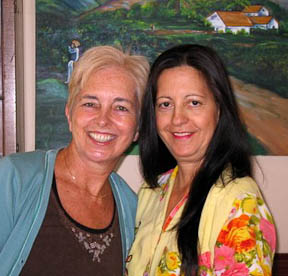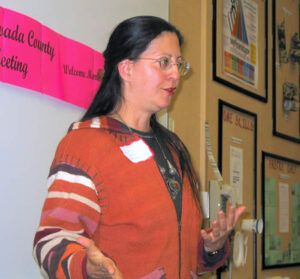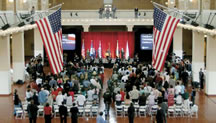
Luz Rahlwes with Tutor Sharon Bailey-Bok
Success in one Tutoring Partnership: Small Steps, Laughs and Facing Fear
By Tutor Sharon Bailey-Bok
with English student Luz Maria Rahlwes 20 August 2008
Luz Maria and I did not bond right away. She was suspicious, withdrawn and somewhat cynical that she would find a tutor that she could count on. Her past experiences with English classes had not been stellar. Over the years, I have tutored children and young adults. Later I taught college. I was better suited to that and so I purposely sought out a student who was older and female. Luz and I are close in age, in our mid-fifties. When we first met at a local cafe, I could see that Luz was not optimistic. Luz Maria is a proud woman with a college degree (in Spanish) from the University of Bogota and so she did perk up when I acknowledged that I know the people of Colombia are known for speaking the most beautiful Spanish in all of Latin America. That made her smile and I could see an opening…a chance for mutual respect. And we ended up doing better than that.
Initially, we found that meeting in Luz’s home (she works nights and her husband works days) worked for us. We could share tea and be expressive. Her English was in that stage of verging on intermediate with large gaps. We needed to work on the basics to fill in those gaps and pronunciation issues. Yet it was clear to me that for Luz to progress in English, the study had to be relevant to Luz’s life NOW. We used workbooks and drills AND I had her write down any phrases or words she heard at work that she did not understand (as a caregiver for an assistant living facility). That was eye-opening for both of us. The subtle and not-so-subtle racism and classism that non-native English speakers face in our society can be appalling. I won’t “go” there” now, but it was clear those clients/patients and coworkers could be quite abusive. We worked on what Luz heard AND on constructive responses. And we slowly built trust.
We worked on phone calls – both making and receiving them. At the beginning, Luz was terrified of answering the phone for fear of not understanding. We worked on this from day one. Part of her homework was to call me. At first we just confirmed our next meeting. Gradually, we talked more. We worked on saying the alphabet since it reads differently in English than in Spanish. At work, she was often asked to find one client or another and the caller would spell the name. So on the phone, I would spell names and she would have to write them down correctly. Progress was made in spite of setbacks.
One day Luz received a call from a doctor’s receptionist who admonished Luz for missing an appointment saying Luz would still be charged $80 for the visit. This time I intervened. It turns out Luz had heard “28th” instead of “20th” for the appointment date. We were able to convince the billing department to forgive the error and reschedule without the penalty fee. And the receptionist promised to speak more clearly!
And even as we did more advanced work, we continued to go back to the alphabet…over and over and over again. I tried to find fun ways to expand Luz’s vocabularyandto introducesome of the vast variety of idiomatic phrases in our English. I even did the old Mickey Mouse Club cheer with “Why? Because I like you!” but it was to remember the letter “Y,” so different in Spanish. I made my body into the shape of a tall “Y”. Sounds silly? Guess what? It worked. And it was fun. We tutors need to be willing to take chances and laugh at ourselves just as we are asking our students to do.
Emailing one another each week proved effective as well. While Luz’s spelling needed improvement, the important thing was that she was beginning to express herself, to open up in English. For anyone who tries to learn a second or third language, this attempt at personal expression beyond the basics is a huge step. We found the use of the computer to be a wonderful addition to the learning “program” and as time went on, this became more and more important. In fact, use of emails and phone calls became central to much of our work.
As Luz began to “find her voice” in English, my husband, Curtis, and I were studying Spanish. There was a group of Spanish-learners that got together monthly for Spanish conversation and a potluck dinner. The potluck aspect led us to see this as an opportunity for Luz to have a real Nevada County-USA-type of cultural experience. Not only did it open up new social connections for Luz, but the chance to speak freely in Spanish, her native tongue, was uplifting for her and enlightening for the rest of us. Luz shone at that event! She told stories about her life and about her beloved Colombia; she danced and sang and I watched as I saw a vibrant, funny, charming personality emerge. This “opening up” was a great release for Luz and, wonderfully, because she feels comfortable with the people around her now, this carried over to her English. It has been a fascinating transformation that I feel honored to witness. Luz then even gave the “student perspective” talk at one of the literacy council annual meetings and she had people captivated and laughing. As a tutor, this was one of my proudest moments.
 After about a year, we wanted a change of venue. We found a small cafe that was quiet, uncrowded and had lots of light and cheer. We could sit with my chai and her coffee and work and practice and laugh. We met at least twice a week, often for two hours. One day, Luz told me that she wanted to pursue her USA citizenship. We figured out how to get the forms and she brought them to a lesson. We made a copy and used that for the work. The forms opened up my eyes again. The process became complicated since Luz had been married before in Colombia and has a college age son there plus her current husband, a naturalized USA citizen originally from Germany, had been married before. We needed information on those people-of-the-past to complete certain forms. It took months as this required searching and the cooperation of other people who did not have Luz’s desire and sense of urgency. Finally, the forms were completed.
After about a year, we wanted a change of venue. We found a small cafe that was quiet, uncrowded and had lots of light and cheer. We could sit with my chai and her coffee and work and practice and laugh. We met at least twice a week, often for two hours. One day, Luz told me that she wanted to pursue her USA citizenship. We figured out how to get the forms and she brought them to a lesson. We made a copy and used that for the work. The forms opened up my eyes again. The process became complicated since Luz had been married before in Colombia and has a college age son there plus her current husband, a naturalized USA citizen originally from Germany, had been married before. We needed information on those people-of-the-past to complete certain forms. It took months as this required searching and the cooperation of other people who did not have Luz’s desire and sense of urgency. Finally, the forms were completed.
 Eventually, Luz was called for her citizenship interviews. She was doing fine and then came the oral interview. It seems there was confusion. Luz’s husband often traveled for construction work and he was, as I understand it, on one of these trips. When asked if her husband was at home, Luz said no. It was a very literal and honest and correct answer. But it was misinterpreted by the interviewer who assumed this meant that Luz and her husband were separated. Oh, my. This confusion led to a rejection of Luz’s application for citizenship. It was a very tough year for Luz. After hundreds of dollars in extra fees and the help of others at the literacy council (PiELL now), persistence and more hard work, the situation was eventually corrected. Note: Even though the error was acknowledged, no penalty funds were returned. In spite all this, Luz finally received word that she had been approved and on 28 March 2008 Luz Maria Rahlwes, in a signing ceremony in Sacramento, became a citizen of the U.S.A.
Eventually, Luz was called for her citizenship interviews. She was doing fine and then came the oral interview. It seems there was confusion. Luz’s husband often traveled for construction work and he was, as I understand it, on one of these trips. When asked if her husband was at home, Luz said no. It was a very literal and honest and correct answer. But it was misinterpreted by the interviewer who assumed this meant that Luz and her husband were separated. Oh, my. This confusion led to a rejection of Luz’s application for citizenship. It was a very tough year for Luz. After hundreds of dollars in extra fees and the help of others at the literacy council (PiELL now), persistence and more hard work, the situation was eventually corrected. Note: Even though the error was acknowledged, no penalty funds were returned. In spite all this, Luz finally received word that she had been approved and on 28 March 2008 Luz Maria Rahlwes, in a signing ceremony in Sacramento, became a citizen of the U.S.A.
Our work continues and, as a special gift to both of us, our friendship continues to grow. I am not sure who has benefited more, student or tutor. Thank you, Partners in English Language Learning, for providing the groundwork and forum for such connections in our community.
